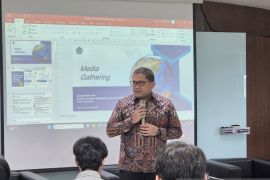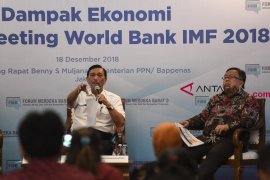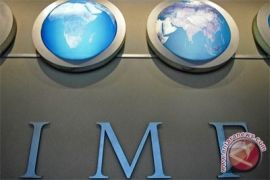In order to evaluate the current development in the country with regard to short-term, medium-term, and future perspectives, the team led by David Cowen held a discussion about 2014 Article Consultation with the government and Bank Indonesia on the IMF website.
The team also held meetings with the private sector, civilian communities, and academics. The results of the visits and discussion will be presented to the IMF Executive Board in February 2015.
"The good management of macroeconomics has increased the credibility of Indonesias policies and external resilience. The countrys policies and foreign exchange reserves have been strengthened over the past 18 months," David Cowen said in a press statement posted on Bank Indonesias website on Monday.
The framework of policies at present has been focused on maintaining macroeconomic and financial stability while promoting structural reform to increase economic growth potentials and employment opportunities for young people in Indonesia. The reforms to expand fiscal room, deepen financial market and cover infrastructure gaps and skills can boost growth to six percent or more in the medium term."
According to the IMF team, in the short term, Indonesias economic prospect will continue to be influenced by global conditions as a result of the declining prices of commodities and tightening of financial conditions.
However, Indonesias GDP growth is projected to be maintained at 5.1 percent in 2015, supported by recovery in investments and increase in manufacturing exports.
Inflation will increase temporarily due to the recent fuel price hikes but is expected to drop to three to five percent, as predicted by Bank Indonesia, by the end of 2015.
Although the prices of commodities are down, the current account deficit is projected to drop by around 2.75 percent from the GDP in 2015, boosted by rising manufacturing exports and lower payment of oil imports.
In the future, risks will emerge especially due to slowing economies in emerging partner countries, which is expected to be deeper than predicted due to increasing volatility in the global financial market.
The IMF team further said that the governments step to reduce fuel subsidy in November has given it some budget room to provide a safety net in the short term for the most vulnerable sections of the community and support plans to increase spending for social needs and capital expenditure.
The fiscal position is expected to be strengthened by further reforms supported by medium-term development plans.
"The countrys monetary policy continues to strongly anchor inflation expectation. This will help support strengthening Indonesias external position, with the help of a more flexible exchange rate framework. In the future, a combination of tight monetary policy and flexible exchange rate will help narrow current account deficit, with support from careful fiscal position and the acceleration of structural reform," Cowen noted.
According to the IMF team, macroeconomic and micro-prudential policy need to be continued to maintain stable financial system.
Efforts for deepening Indonesias financial market will also strengthen its financial system and help mobilize long-term savings needed to support investments. Strengthening financial stability with support from the law on financial system safety net should be a priority.
Finally, a comprehensive and clear strategy for overcoming obstacles in supply and improving investment climate will support economic growth in the medium term, as long as it is supported by trade policy directed at boosting exports.
(Reporting by Citro Atmoko/Uu.H-YH/INE/KR-BSR/A014)
Editor: Priyambodo RH
Copyright © ANTARA 2014








